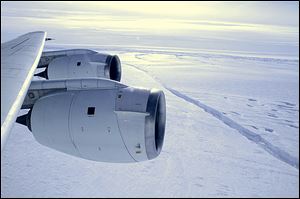
CLIMATE CHANGE
Experts boost estimate of Antarctica warming
Eventual ice-sheet collapse called likely
12/24/2012
A NASA DC-8 research plane flies over the crack form-ing across the Pine Island Glacier ice shelf in Antarctica.
WASHINGTON — New research suggests that West Antarctica has warmed much more than scientists thought over the last half-century. The finding is ominous because the ice sheet there may be vulnerable to long-term collapse, with potentially drastic effects on sea level.
A paper released Sunday by the journal Nature Geoscience found that the temperature at a research station in West Antarctica has risen by 4.3 degrees Fahrenheit since 1958. That is roughly twice as much as scientists previously thought and three times the overall rate of global warming.
“When you see this type of warming, I think it’s alarming,” said Andrew Monaghan, a scientist at the National Center for Atmospheric Research in Boulder, Colo., who took part in the study. West Antarctica holds enough ice to raise world sea levels by 11 feet if it ever all melted. That process, however, would take centuries.
The warming “raises further concerns about the future contribution of Antarctica to sea-level rise,” Ohio State University said in a statement on the study led by David Bromwich, a geography professor there.
Low-lying nations from Bangladesh to Tuvalu are especially vulnerable to sea-level rise, as are coastal cities from London to Buenos Aires. Sea levels have risen by about eight inches in the past century.
A United Nations panel of climate experts projects that sea levels will rise this century by a range of 7 inches to 24 inches, and by more if a thaw of Greenland and Antarctica accelerates.
Warming in Antarctica is a relative concept. West Antarctica remains exceedingly cold, with average annual temperatures in the center of the ice sheet that are nearly minus-50 degrees Fahrenheit. But the temperature there does sometimes rise above freezing in the summer.
The new research raises the possibility that such a temperature rise might begin to happen more often, potentially weakening the ice sheet through surface melting. A potential collapse of the West Antarctic ice sheet is one of the long-term hazards that have led experts to worry about global warming.
The new research is an attempt to resolve a scientific controversy that erupted several years ago about how rapidly West Antarctica is warming.
With few automated weather stations and even fewer human observers in the region, scientists have used statistical techniques to infer long-term climate trends from sparse data. A 2009 paper found extensive warming in the main part of West Antarctica, but those results were challenged by a group that included climate-change contrarians. Mr. Bromwich pulled together a team that focused on a single temperature record.
At a lonely outpost called Byrd Station, in central West Antarctica, people and automated equipment have been keeping track of temperature and other weather variables since the late 1950s. It is by far the longest weather record in that region, but it had intermittent gaps and other problems that had made many researchers wary of it.
The Bromwich group decided to try to salvage the Byrd record. They retrieved one of the sensors and recalibrated it at the University of Wisconsin. They discovered a software error that had introduced mistakes into the record and then used computerized analyses of the atmosphere to fill the gaps.
The reconstruction is likely to undergo intensive scientific scrutiny. If the research holds up, it suggests that the 2009 paper, far from overestimating warming in West Antarctica, had most likely underestimated it. Eric Steig, a University of Washington researcher who led the 2009 work, said he considered his paper to have been supplanted by the new research.
Mr. Bromwich said recent weather in West Antarctica seems to have become erratic. He worries that this could become routine, perhaps accelerating the decay of the West Antarctic ice sheet, but the warming is not fast enough for that to happen right away.
“We’re talking decades into the future, I think,” Mr. Bromwich said.